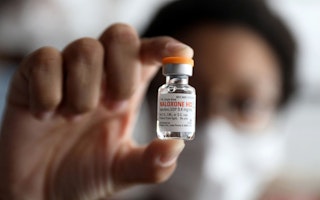Why Are Police Still Torturing Drug Users in Indonesia?
By Sanjay Patil
How do police in developing democracies treat those whom they regard as criminals, and what does this tell us about citizenship and government responsibility as a whole? That question is at the heart of a recent study by four drug user advocacy groups (Forkon, Panazaba, Performa, and EJA) that documented how the police torture, illegally detain, and extort those suspected of using illegal drugs in Indonesia. What the groups found is that the police often beat, sexually assault, and harass drug users with impunity. This shows how far the Indonesia National Police have to go in realizing the reforms begun by the government in 1998 to make the police force one that protects individual rights and respects basic procedures.
The groups unveiled their report in Jakarta, where the Jakarta Post linked their findings to the story of one family who had paid more than U.S.$66,000 in the hopes that their son would be sent to treatment rather than the country’s notoriously overcrowded prisons. For this family, and all drug users, the door to extortion or abuse was opened by the harsh frame of the antinarcotics law, which requires that families of drug users report their relatives to the police or risk criminal charges. The interviews and surveys by the drug user groups revealed that bribery was only part of the pattern of abuse: the most troubling revelation of the report was that 76 percent of those surveyed had experienced police violence, and 51 percent had been tortured. Although Indonesia ratified the Convention against Torture in 1998, the gap between paper and practice is still wide. Whether they are using torture or cruel punishment, police coerce confessions and force detainees to provide information against others. Officers are rarely, if ever, held accountable for their actions.
Of course, the national police have been known to violate the human rights of people from all over Indonesia, not just drug users. However, the vulnerability of criminalized groups like drug users means that it is much more difficult for them to know how to prevent abuse from happening in the first place or to feel entitled to seek remedy after it has occurred. Police misconduct clearly has a negative impact on the ability of drug users to access health and other social services. For instance, some are refused access to HIV treatment while in police custody or find that the police disclose their HIV status to others.
Pushing people who use drugs even further underground will not help them or the larger community. Torturing and beating is illegal and immoral. In order to bring about real reform to Indonesia’s national police, we must first recognize that draconian treatment of a few has significant health, legal, and moral consequences for all.
Until January 2020, Sanjay Patil was a senior team manager for the Strategy Unit of the Open Society Foundations.

